MARKET OVERVIEW
The Global Liposuction Surgery Devices market is characterized by continuous advancements and transformative innovations. In recent years, this market has witnessed significant growth, fueled by the increasing demand for aesthetic enhancements and the pursuit of body contouring solutions. Liposuction, a widely practiced cosmetic procedure, has become a popular choice for individuals seeking to achieve a desired physique. The market for liposuction surgery devices encompasses a range of sophisticated tools and technologies designed to enhance the precision and effectiveness of the liposuction procedure.
One of the key components driving the Global Liposuction Surgery Devices market is the evolution of minimally invasive techniques. As technology advances, there is a growing trend toward procedures that minimize trauma and reduce recovery times. Liposuction surgery devices play a crucial role in facilitating these minimally invasive approaches, offering surgeons advanced tools to navigate the intricacies of fat removal with precision and finesse.
Moreover, the market is witnessing a surge in the development of innovative technologies, such as laser-assisted liposuction and ultrasound-assisted liposuction devices. These cutting-edge devices bring an unprecedented level of sophistication to the liposuction procedure, allowing for enhanced targeting of specific areas and improved overall outcomes. The integration of such technologies into liposuction surgery devices reflects a commitment to pushing the boundaries of what is achievable in cosmetic surgery.
The global liposuction surgery devices market is also shaped by the increasing awareness and acceptance of cosmetic procedures across different demographics. As societal attitudes evolve, the market experiences a broader consumer base seeking liposuction solutions. This shift in demographics contributes to the expanding scope of the market, with manufacturers and developers continually innovating to meet the diverse needs of a global clientele.
In addition to technological advancements, market growth is influenced by factors such as regulatory landscape changes and the emphasis on safety standards within the cosmetic surgery industry. Stricter regulations and a heightened focus on patient safety drive the continuous refinement of liposuction surgery devices to ensure compliance and the highest standards of performance.
The Global Liposuction Surgery Devices market is a vibrant and rapidly evolving sector that plays a pivotal role in shaping the landscape of cosmetic surgery. The interplay of technological innovations, changing demographics, and regulatory dynamics underscores the dynamic nature of this market, as it continues to contribute to the advancement of aesthetic medicine on a global scale.
Global Liposuction Surgery Devices market is estimated to reach $5,199.1 Million by 2030; growing at a CAGR of 10.8% from 2023 to 2030.
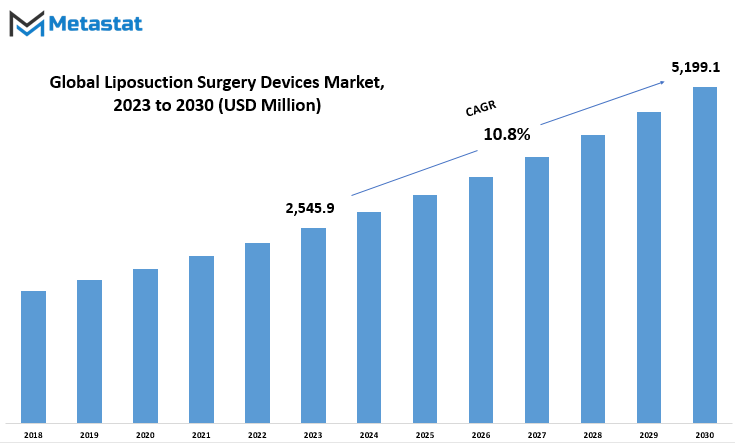
GROWTH FACTORS
In the expansive landscape of the Global Liposuction Surgery Devices market, several key factors propel its growth trajectory. These factors act as catalysts, steering the market towards advancements and opportunities. Understanding these growth factors is crucial in navigating the market dynamics.
Foremost among the drivers is the increasing awareness and demand for cosmetic procedures. As individuals become more conscious of aesthetics, the demand for liposuction surgery devices rises. This heightened awareness is fueled by societal trends and a growing emphasis on physical appearance.
Technological advancements stand as another pivotal growth factor. The continuous innovation in liposuction surgery devices enhances their efficiency and safety, attracting both practitioners and patients. These advancements contribute significantly to the market's expansion, making liposuction procedures more accessible and appealing.
However, the market is not immune to challenges. Regulatory hurdles and safety concerns pose potential obstacles to growth. Stringent regulations may impact the approval and commercialization of new devices. Additionally, concerns about the safety and potential side effects of liposuction procedures can act as deterrents, affecting market growth.
Economic factors also come into play. The cost associated with liposuction procedures, including the devices used, can be a limiting factor for some individuals. Economic downturns or financial constraints might curb the willingness of potential patients to undergo such cosmetic treatments, impacting the market negatively.
Despite these challenges, the market remains resilient and adaptable. Opportunities emerge in the form of technological breakthroughs, creating devices that address safety concerns and enhance the overall liposuction experience. These innovations open new avenues, attracting a broader demographic and overcoming potential hindrances.
The Global Liposuction Surgery Devices market experiences growth propelled by increased aesthetic awareness and continuous technological advancements. However, challenges such as regulatory constraints and safety concerns persist. The future of the market hinges on its ability to leverage opportunities, particularly those arising from innovations that address safety issues and make liposuction procedures more accessible. Navigating these dynamics requires a nuanced understanding of both the driving factors and potential impediments, ensuring a balanced and informed approach in the ever-evolving landscape of cosmetic procedures.
MARKET SEGMENTATION
By Product Type
The Global Liposuction Surgery Devices market, a dynamic landscape influenced by diverse factors, finds segmentation in its product types, catering to varied preferences and needs. In this market, Stand-alone Liposuction Surgery Devices and Portable Liposuction Surgery Devices emerge as distinct categories, each contributing to the market’s vibrancy.
The Stand-alone Liposuction Surgery Devices segment, valued at 1350.3 USD Million in 2021, represents a traditional yet robust approach to liposuction procedures. These devices, characterized by their self-sufficiency, offer a standalone solution for practitioners, providing the necessary tools and technologies in a comprehensive package. This segment’s substantial valuation underscores the enduring relevance and preference for established liposuction methods.
On the other hand, the Portable Liposuction Surgery Devices segment, valued at 736.2 USD Million in the same year, reflects the growing trend towards flexibility and mobility in medical equipment. These devices, designed for portability, offer practitioners the advantage of maneuverability, allowing them to adapt to various clinical settings. The noteworthy valuation of this segment signifies the increasing adoption of portable solutions in the liposuction domain.
Both segments address the evolving needs of the healthcare landscape, offering practitioners options that align with their preferences and the requirements of their practice. The Stand-alone devices cater to those favoring a comprehensive and fixed solution, while the Portable devices cater to the demand for flexibility and adaptability in medical procedures.
The Global Liposuction Surgery Devices market’s product segmentation into Stand-alone and Portable categories exemplifies the adaptability of the industry to changing preferences. It mirrors the nuanced choices of practitioners, acknowledging the enduring appeal of established methods and the growing interest in flexible, portable solutions. This segmentation underscores the industry’s commitment to providing diverse options, ensuring that liposuction procedures can be performed efficiently and effectively across a spectrum of clinical scenarios.
By Technology
In the Global Liposuction Surgery Devices market, technology stands as a defining factor, shaping the methods and tools employed in this cosmetic procedure. The market is diversified into various technologies, each bringing its unique attributes to the forefront.
Tumescent Liposuction, a widely adopted technology, forms a cornerstone in liposuction procedures. Renowned for its effectiveness, it involves injecting a tumescent solution into the targeted area, facilitating easier fat removal. Ultrasound-assisted Liposuction (UAL) introduces ultrasound energy, aiding in the breakdown of fat cells for smoother extraction.
Laser-assisted Liposuction (LAL), another prevalent technology, employs laser energy to liquefy fat, enhancing precision in sculpting desired body contours. Power-assisted Liposuction (PAL) integrates mechanized assistance, reducing the physical exertion required during the procedure. BodyJet or Water Assisted Liposuction (WAL) introduces a gentle water-based approach, minimizing trauma to surrounding tissues.
Jplasma, a more advanced technology, utilizes cold plasma energy to liquefy and remove fat, providing a precise and controlled method. The market further incorporates other innovative technologies, each contributing to the diversification and refinement of liposuction procedures.
These technologies collectively reflect the dynamic nature of the Global Liposuction Surgery Devices market, offering practitioners and patients a spectrum of choices to cater to individual needs. Tumescent, Ultrasound-assisted, Laser-assisted, Power-assisted, Water Assisted, Jplasma, and various other technologies not only showcase the evolution of liposuction methods but also highlight the commitment to enhancing patient outcomes through technological advancements.
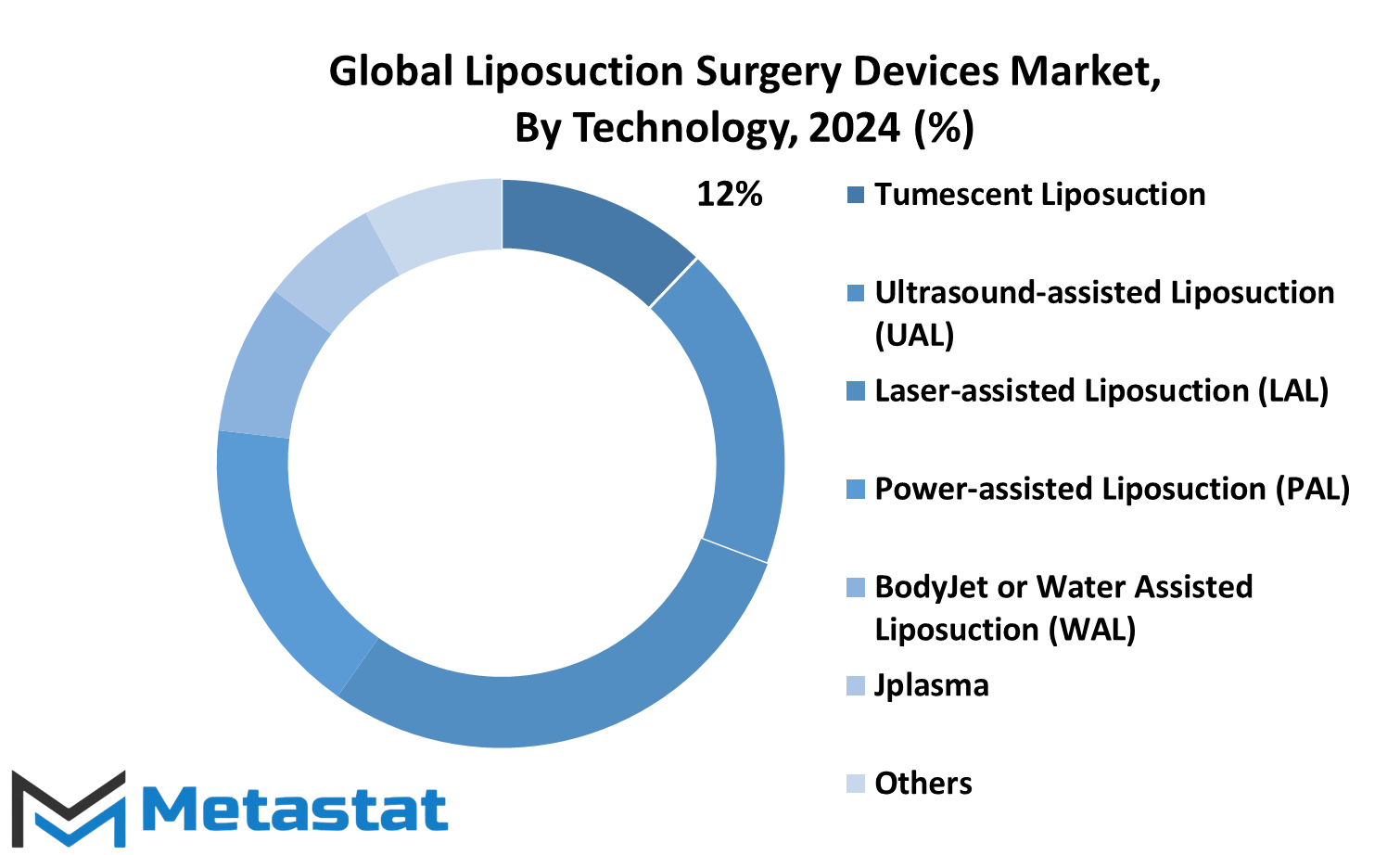
REGIONAL ANALYSIS
The global Liposuction Surgery Devices market unfolds across different geographical territories, providing a nuanced perspective on its distribution and impact. In this expansive market, North America and Europe emerge as key players, each playing a distinct role in shaping the market landscape.
North America, a prominent hub for medical advancements and innovations, stands tall in the global Liposuction Surgery Devices market. With a robust healthcare infrastructure and a penchant for cutting-edge technologies, the region contributes significantly to the market's growth. The demand for liposuction surgery devices is notably high in North America, reflecting a cultural inclination toward aesthetic procedures and a health-conscious population.
On the other side of the Atlantic, Europe, with its diverse healthcare systems and a populace attuned to cosmetic interventions, also holds a considerable share in the Liposuction Surgery Devices market. European countries exhibit a growing awareness and acceptance of cosmetic procedures, fostering a conducive environment for the adoption of liposuction surgery devices.
Together, North America and Europe create a formidable force in steering the trajectory of the global Liposuction Surgery Devices market. Their influence extends beyond their borders, setting benchmarks and trends that resonate across the industry. The collaborative dynamics between these regions contribute to the overall growth and development of the market, as innovations and best practices are shared and adopted on a global scale.
The geographical division of the Liposuction Surgery Devices market is not just a matter of physical boundaries; it signifies the convergence of healthcare landscapes, cultural attitudes, and technological prowess. Understanding the market in this regional context allows stakeholders to tailor strategies, recognizing the unique dynamics at play in North America and Europe. In essence, the global market for liposuction surgery devices finds its pulse in these key regions, where medical advancements and societal preferences converge to shape the future of cosmetic interventions.
COMPETITIVE PLAYERS
In the Global Liposuction Surgery Devices market, key players wield influence, shaping the industry's trajectory. Among these players, Alma Lasers Ltd., Apyx Medical Corporation, and Cynosure Inc. stand prominently, contributing significantly to the market's dynamics.
Alma Lasers Ltd. holds a strategic position, leveraging its expertise to provide cutting-edge solutions in the liposuction surgery devices sector. Apyx Medical Corporation, another significant player, brings innovation to the forefront, driving advancements in medical technologies. Cynosure Inc. rounds out this trio, making noteworthy contributions to the industry with a focus on precision and efficacy in liposuction procedures.
These key players not only contribute to the technological landscape but also play a vital role in shaping market trends. Alma Lasers Ltd., with its commitment to technological excellence, sets a benchmark for the industry. Apyx Medical Corporation, through its innovative approach, fosters a culture of continuous improvement, pushing the boundaries of what liposuction surgery devices can achieve. Cynosure Inc., with a focus on precision, ensures that the devices meet the high standards required in the medical field.
Collaborations, research, and development initiatives, and market strategies are common threads binding these key players. Their collective efforts drive the evolution of liposuction surgery devices, ensuring that these technologies align with the evolving needs of the medical community.
As the Global Liposuction Surgery Devices market continues to expand, the roles played by these key players become increasingly significant. They not only shape the present landscape but also lay the groundwork for the future of liposuction surgery devices, fostering a competitive yet collaborative environment that ultimately benefits both practitioners and patients alike.
Liposuction Surgery Devices Market Key Segments:
By Product Type
- Stand-alone Liposuction Surgery Devices
- Portable Liposuction Surgery Devices
By Technology
- Tumescent Liposuction
- Ultrasound-assisted Liposuction (UAL)
- Laser-assisted Liposuction (LAL)
- Power-assisted Liposuction (PAL)
- BodyJet or Water Assisted Liposuction (WAL)
- Jplasma
- Others
Key Global Liposuction Surgery Devices Industry Players
- Alma Lasers Ltd.
- Apyx Medical Corporation
- Cynosure Inc.
- Genesis Biosystems, Inc.
- InMode Ltd.
- MicroAire Surgical Instruments, LLC
- Sciton Inc.
- SOLTA Medical Corporation
- YOLO Medical Inc.
- Cutera, Inc.
- Erchonia Corporation
WHAT REPORT PROVIDES
- Full in-depth analysis of the parent Industry
- Important changes in market and its dynamics
- Segmentation details of the market
- Former, on-going, and projected market analysis in terms of volume and value
- Assessment of niche industry developments
- Market share analysis
- Key strategies of major players
- Emerging segments and regional growth potential



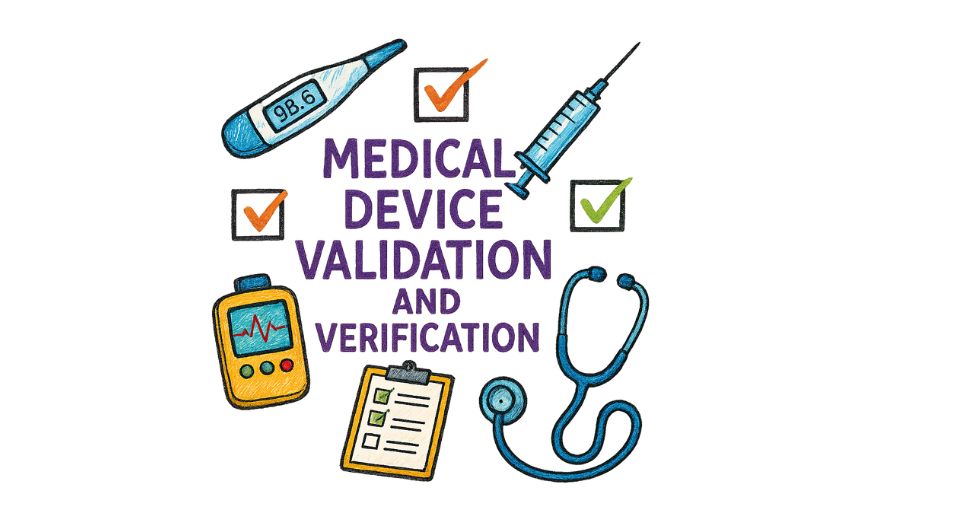
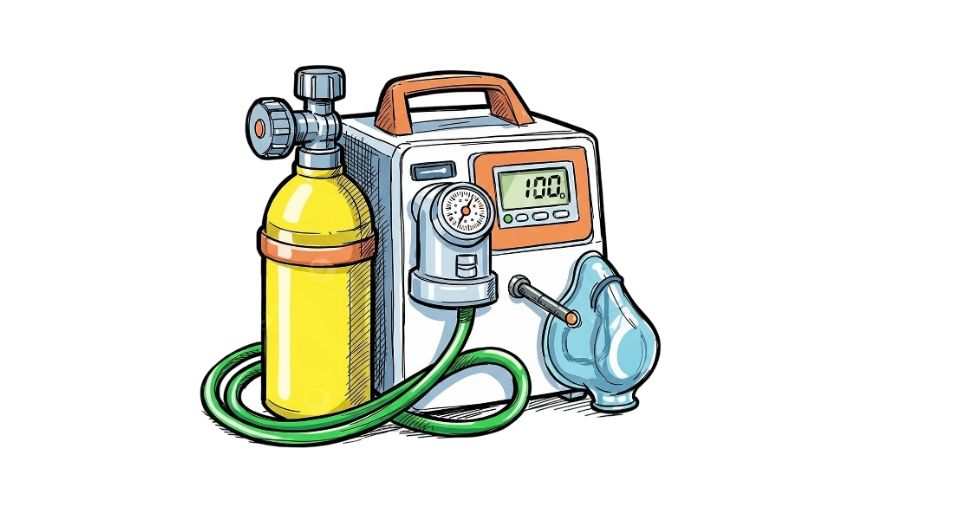

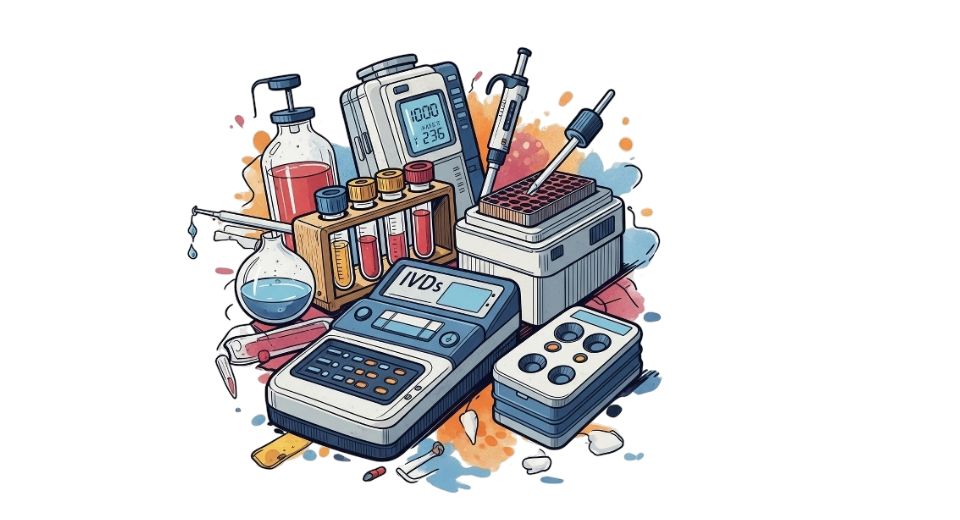

 US: +1 3023308252
US: +1 3023308252






